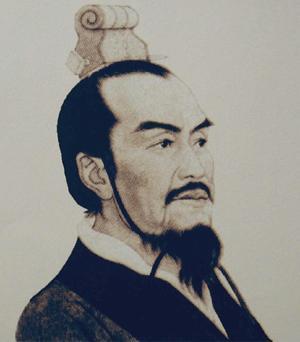(单词翻译:单击)
Li Si (born 280 B. C.,Chu state,central China,died 208 B. C.,Xianyang) was a Chinese statesman who utilized the ruthless but efficient ideas of the political philosophy of Legalism to weld the warring Chinese states of his time into the first centralized Chinese empire,the Qin Dynasty.
李斯,大概公元前280年生在中国中部的楚国,公元前208年死于咸阳,政治家。李斯利用无情但是有效的法家思想统一了战国时期的各个诸侯国,建立了中央集权的中国帝国---秦朝。
In 247 B. C. he entered the state of Qin to begin almost 40 years of service under the ruler later known as Shih Huang-ti (“First Sovereign Emperor").
公元前247年李斯来到秦国,开始了将近40年的为秦王(后来的始皇帝)的服务。

As minister to the emperor,Li was responsible for most of the radical political and cultural innovations made in Qin after 221 B. C..
作为始皇帝的大臣,李斯负责了秦国公元前221年后大多数的政治和文化改革。
Li caused the empire to be divided into 36 regions,each governed by a centrally appointed official.
李斯促使帝国分为36个地区,每个地区由中央委派官员治理。
Under his guidance the emperor standardized coinage and weights and measures and began construction of the Great Wall to keep out barbarians from the north.
在李斯的指导下,秦始皇统一了度量衡并且为了防止北方的蛮人人侵开始修建长城。
Li Si was also influential in creating a unified writing system,which remained substantially the same until recent times.
对于文字的统一,李斯也是有影响的。统一后的文字一直使用到近代。
Finally,in an effort to prevent the growth of subversive thought,Li in 213 B. C. forbade the teaching of history and ordered the “burning of the books,” for which he earned the opprobrium of all future generations of Confucian scholars.
最后,为了避免破坏性思想的成长,李斯于公元前213年禁止教授历史并且下令“焚书”,李斯因此受到了后来所有儒生的责骂。
When the emperor died in 209 B. C.,Li became involved in the eunuch Zhao Kao's plot to void the proper succession.
公元前209年始皇帝驾崩,李斯卷人了宦官赵高取消正当继位的阴谋。
But the two conspirators quarreled,and Zhao Kao had Li executed.
但是这两个阴谋家发生了反目,赵高处死了李斯。


